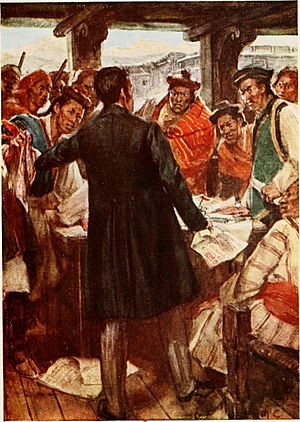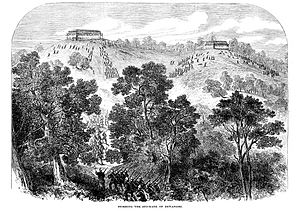Duar War facts for kids
Quick facts for kids Duar War |
|||||||||
|---|---|---|---|---|---|---|---|---|---|
 Ashley Eden forced by the Bhutanese to sign a Treaty, 1864. Illustration by A.D. Macromick (1909) |
|||||||||
|
|||||||||
| Belligerents | |||||||||
| Commanders and leaders | |||||||||
| Kagyud Wangchuk (1864) Tshewang Sithub (1865) |
|||||||||
The Duar War (also called the Anglo-Bhutan War) was a conflict between British India and Bhutan. It happened from 1864 to 1865. This was the only war between these two countries since 1774.
Contents
Why the War Started
Throughout the 1800s, British India sent many groups to Bhutan. Official papers said these visits were because Bhutanese people sometimes raided areas across the border. They also said Bhutan was hiding people who were against the British.
However, many historians today believe the real reason was that Britain wanted to expand its power. Bhutan was important for trade between India and Tibet. Also, the British knew the Duars region was great for growing tea.
The Eden Mission
A key event before the war was a "peace mission" led by Ashley Eden in 1863-1864. This mission was sent during a civil war in Bhutan.
Bhutan did not accept the British offer. Eden later said he was treated badly during his visit.
At that time, a local leader called the dzongpon of Punakha had won a civil war. He had broken away from Bhutan's main government. He even set up his own rival leader, called the Druk Desi. The original Druk Desi sought protection from another leader, the penlop of Paro, and was later removed from power. The British mission talked with both the rival leader of Paro and the penlop of Trongsa, who was acting for the Druk Desi.
How the War Was Fought
Britain declared war in November 1864. Bhutan did not have a regular army. Their fighters were mostly guards from their forts, called dzongs.
These guards used older weapons like matchlocks (an early type of gun), bows and arrows, swords, knives, and catapults. Some guards wore shields and chainmail armor. They fought against the British forces, who had much more modern equipment.
The fort known as Dewangiri, located at Deothang, was taken apart by the British in 1865. The British first faced a tough defeat at Deothang. When they took Dewangiri back, they destroyed the fort. This was to stop Bhutanese forces from using it again.
The Duar War lasted only five months. Even though Bhutanese forces won some battles and even captured two howitzer guns, they lost a lot. Bhutan lost 20% of its land. They also had to give up areas they had controlled before.
The Treaty of Sinchula
| Signed | 11 November 1865 |
|---|---|
| Location | Sinchula |
| Effective | 11 November 1865 |
| Condition | Bhutanese cessation of withdrawal of claims to suzerainty of Cooch Behar and the Duars |
| Expiration | 1910 |
| Signatories | Sikkim Political Officer Herbert Bruce; Bhutanese King Ugyen Wangchuck and his ministers |
| Parties | British India; Bhutan |
| Ratifiers | Viceroy and Governor-General Sir John Lawrence (British India) |
| Language | English |
The war ended with the Treaty of Sinchula. This treaty was signed on November 11, 1865.
Under this treaty, Bhutan gave up land in the Assam Duars and Bengal Duars. They also gave up 83 square kilometers of land in Dewangiri, in southeastern Bhutan. In return, the British agreed to pay Bhutan 50,000 rupees each year.
The Treaty of Sinchula was in effect until 1910. That year, Bhutan and British India signed a new agreement called the Treaty of Punakha. This new treaty lasted until 1947.
See also
- Foreign relations of Bhutan
- History of Bhutan
- Treaty of Punakha
 | Aaron Henry |
 | T. R. M. Howard |
 | Jesse Jackson |


